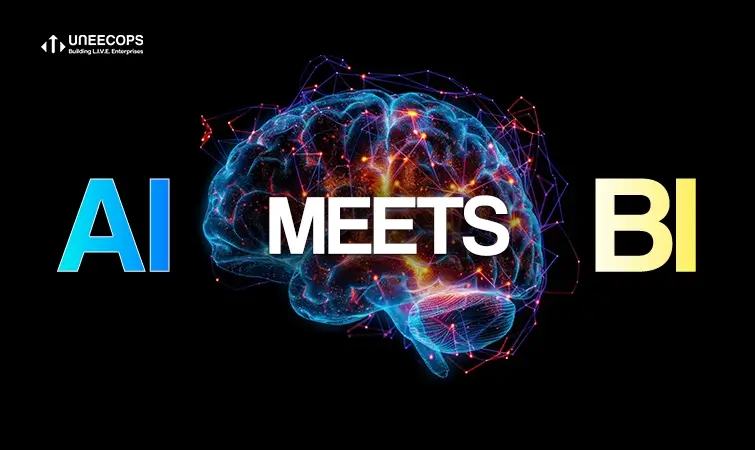Data is powerful, but AI makes it unstoppable! AI is not just improving Business Intelligence—it’s revolutionizing it! From predictive analytics to automated insights all major industries across the globe have been revolutionized by the integration of artificial intelligence. And, this is true even for business intelligence. AI in BI has been a marvelous addition that is consistently taking over the whole BI intelligence. AI in business intelligence automates a lot of tasks that previously used to be done manually.
AI in BI also provides real-time data insights that are extremely accurate and help businesses make crucial business decisions with ease. These are just some of the AI in Business examples. In this article about AI in BI, we will understand how AI for business intelligence has provided a great leap in innovation and productivity.
Harnessing AI for BI: The Key to Competitive Advantage
AI in BI basically means the integration of artificial intelligence in BI solutions for greater efficiency and outputs. AI in business intelligence uses machine learning and advanced predictive technology that studies data to lay a roadmap of future trends. AI in BI is crucial in providing automated data insights by studying real-time data. This is a great advancement from previous traditional systems that heavily relied on historical data for generating insights.
AI in business intelligence also brings itself the NLP tech that empowers users to use natural language for using the advanced business intelligence artificial intelligence software without any technical prowess. These are some common AI in business examples that can be found in all major BI solutions. It seems like everyone has realized the potential of AI for business intelligence.
Turn Data Overload into Business Brilliance with AI in BI
Numerous advantages come with the integration of AI in BI that can’t be overlooked like the following:
- Data-Driven Decisions
A large amount of data can be processed by artificial intelligence within seconds, delivering insights that allow businesses to make quick, informed decisions. Unlike traditional BI, which relies on manual data processing, AI automates the entire workflow, accelerating decision-making processes. AI in BI brings itself the capacity to study and analyze live incoming data to generate actionable and accurate data insights and visualizations. The business intelligence artificial intelligence is so advanced that it can run this entire process automatically without needing any manual support. This hugely impacts and boosts the decision-making capacity of a business. They can now make decisions that will be backed by data for long-term growth and sustenance.
- Reduction of Human Errors
AI in business intelligence drastically diminishes the requirement of any human intervention due to its advanced automation capabilities. These automated processes are conducted with huge precision and are free from any chance of human error.
- Predictive Analytics
AI for business intelligence is also important due to its insane predictive technology. AI in BI studies historical and current data to find patterns and anomalies that can be useful in understanding future market trends. Not only that, business intelligence artificial intelligence also tracks and provides accurate inventory predictions and aids in strategic planning.
- Personalized Customer Insights
AI in BI also can automatically segment and come up with visuals about customer behavior solely from the data. This is highly useful for companies that want to run targeted and successful marketing campaigns.
- Real-Time Analytics
AI in BI does the entire data analysis and processing in real time without any mistakes. Businesses can monitor their inventory, sales, and customer interaction insights in real time and take swift actions to stay on course.
AI That Works: How Industries Are Leveraging AI for Success
The need for AI in business intelligence is seen across industries and verticals. Here are some of the AI in business examples that signify the rapid adoption of business intelligence artificial intelligence by the global order.
- Retail
AI is now an important player in the retail industry due to its amazing machine-learning technology that can study and analyze customer behavior and provide accurate inventory tracking for maximum efficiency and growth. - Finance
Even the finance sector has not been able to avoid the numerous benefits that AI in BI offers. All major financial institutions are using AI to detect fraud and ensure a safe and secure financial environment. - Healthcare
Even though there are still some skeptics of AI in healthcare, business intelligence artificial intelligence has seeped into healthcare systems with no resistance. It now helps in diagnosis, finding newer treatments, and managing healthcare resources with precision and accuracy. - Marketing
AI in BI is in great demand to design and help in their marketing campaigns. AI can study data and come up with highly personalized campaigns and tactics. - Manufacturing
There is a major uptrend in adopting AI for business intelligence among the manufacturers as well. It is now being used to understand market demands, track inventory, and automate tasks of manufacturing units.
AI in BI: Hype vs. Reality – The Challenges No One Talks About
While AI-powered Business Intelligence offers numerous advantages, businesses must also overcome several hurdles to get the best output.
- Data Privacy
AI is now getting access to huge amounts of datasets that may have confidential data like financial or health in nature. There is a risk of it being exploited by any third party or other notorious organizations. - Implementation Costs
AI in Business Intelligence comes with a hefty price. All the major AI-integrated software have higher prices that may not be ideal for small companies with tight pockets. - Integration Issues
Most companies still use and rely on traditional systems for business intelligence. And, making that jump to AI in business intelligence might be a hassle. - Skills Gap
There are also costs for businesses to train their employees to use AI in BI at its maximum potential for greater ROI and efficiency.
However, a professional BI consulting partner like Uneecops helps unveil data’s truest value with augmented analytics and BI solutions and also helps overcome the challenges mentioned. Uneecops combines business intelligence solutions and cutting-edge data analytics software to give you a winning edge. Our scalable services and mastery over BI software solutions deliver real results, propelling you toward foolproof decision-making.
The AI Evolution in BI: What’s Next?
AI in BI has been a major revelation for the past few years. We are seeing consistent advancements in business intelligence and artificial intelligence that are making AI stronger as days go by. We are already witnessing a lot of new job openings for BI professionals with expertise in analyzing and studying AI-generated data reports and marketing recommendations.
Overall, AI in BI is going to play an even more important part in a business’s function and their reliance on AI is only going to get stronger and long-term.
AI in BI has given it a much-needed innovative upheaval. AI in business intelligence is now already an unavoidable entity due to its automation and real-time data analysis features. It can analyze and process tons of data in real time and come up with the most ideal growth strategies that businesses can execute for long-term growth and prosperity. Having AI in business intelligence has proven to be a must-have asset that converts a business into a fierce and strong market competitor.
Take your BI to the next level with AI—let’s discuss your strategy today!







